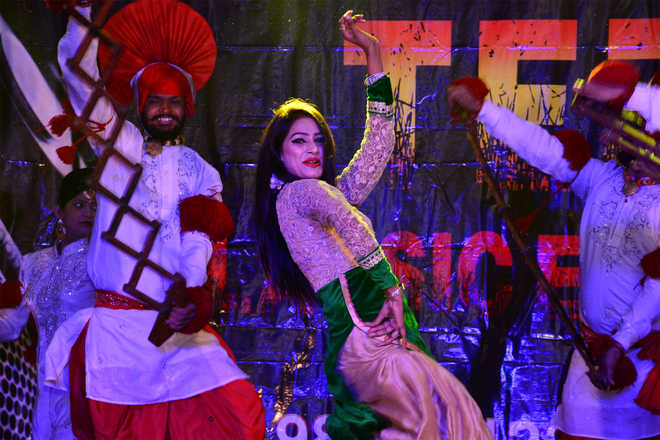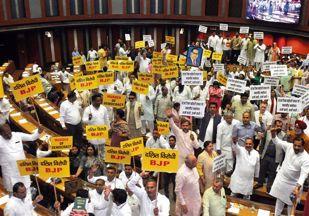
Desperate earnings: The orchestra girls earn anywhere between Rs 2,000 and Rs 3,000 per show, a fairly decent amount as most of them belong to poor families Photos: Naresh Kumar
Sarika Sharma
Every morning Neha wakes up with a resolve to quit her profession. But a look at her ageing parents and two younger sisters is enough to brush aside those thoughts. Being a dancing girl in orchestra isn’t easy, certainly not in a region where men pride themselves on their manhood and display machismo as a tool to subvert the fair sex. But Neha has learnt to accept this. Still, when she hears about a dancer in an orchestra being shot in a celebratory gunfire during a wedding, a shudder goes down her spine. But she has no time to reflect on the tragedy or her plight. It is the wedding season, one of the few times of the year when she gets to earn.
Neha — she insists this is her real name — was 16 when she first decided to give this profession a shot. Her friend, a dancer with an orchestra, had been secretly teaching her the dance moves. One day, Neha gathered the courage to tell her mother that she wanted to take up dancing on stage. The mother wasn’t too glad about it and told her to rethink her decision. Both knew it wasn’t something that commanded respect, but would get them money. She’s the eldest child in the family. Who else will help her father, a daily wager, to make ends meet?
Every orchestra girl’s story is similar. She finds herself pushed into the quagmire due to her family’s poverty. Kulwinder Kaur, who was shot in Bathinda, had been two-months’ pregnant. What drove her to the stage in such a condition? A day after her death poet Surjit Gugh reflects on this dilemma in his untitled poem:
To keep the balance of your paunches,
we keep our bellies hungry.
To bask in the glory of your
celebrations,
we leave behind our happiness
and sorrows;
Our identity, our worries, our
innocence, our suckling kids,
our motherhood...
However, 24-year-old Sunaina (name changed) from Dehradun, is in this profession out of choice. She left her job at a call centre in Mohali to become an orchestra dancer. “I was passionate about dance. My friend told me I could pursue my hobby and earn better too,” she says. It wasn’t tough to convince her mother, but her father was irked with her. However, with money flowing in, he soon overcame his annoyance. These girls earn anywhere between Rs 2,000 and Rs 3,000 per show. If there are two shows in a day in the season, they can earn around Rs 40,000 to Rs 50,000 per month.
The money flows in but at a price, and this doesn’t include just the odd working hours. Drunk men make lewd comments...obscene gestures... They seek proximity. They are permitted a little, but they want to cross the limit. They offer and tease with notes of Rs 10 to 100. Some notes are pushed inside the bra. Others fall on the ground. Men from the orchestra gather these, while the girls go on dancing — and ‘teasing’. Often mechanically. “We become immune to the glares and gestures. Men will be men, but this is our livelihood. If an ugly situation develops, we pack our bags and push off,” says Sunaina. She says Kulwinder’s death has left her parents worried. This may be the last wedding season that she will perform in. They may not allow her to continue dancing.
***
Rajinder Nagi, a former orchestra group manager, still remembers that night four years back. He had bent down to talk to someone when a bullet hit a dancer on the stage in Jaito village. The girl died. The man who fired the shot was imprisoned for 12 years while the one whose gun was used to fire was jailed for six years. Nagi quit the profession and is presently writing a book on orchestra girls. He says most women in the profession have a similar life story. “Most of them have either lost their fathers or have parents who are too old to earn and their brothers are heavily into drugs. A good number of these girls (around 50 per cent) are from Nepal,” claims Nagi, who has spent the past four years talking to these girls for his book.
He claims that earlier some of these girls were into prostitution, who had abandoned their profession because of the physical and emotional torture they faced. “Here money is better and the job doesn’t entail sex work.” Still, he says, the world really doesn’t differentiate between the two. “Men, and even women, think that if a woman is a dancer, she would be into flesh trade too. This may be a reality in some cases though. The others head home after work. But men won’t understand. They will chase women in their cars even when the dance troupes have left, stuff their phone numbers into women’s clothes. I have seen tens of chits drop when these women change,” he says.
Many dancers and troupe heads, including Nagi, say Malwa and Haryana are tough areas to work in. “People in these regions seem fearless of the police and have scant respect for women, not just on stage, but even in their families,” he says.
Nagi ran his orchestra group for nearly six years. He has seen life there up, close. He says “this line” is a swamp. “It is easy to get in, but very tough to get out. This is because the girls get used to a certain life. Also they come from backward villages and once they shift to cities, they move about in cars, eat good food, earn well, smoke, drink and sometimes even do drugs. It is difficult to break free.”
***
It is a foggy Wednesday morning and Kanchan Musical Group is headed to the same marriage palace in Maur Mandi where Kulwinder was shot. “We have to perform on that very stage where the girl was killed. We are scared, but I am pushing myself and the girls with me,” says Kanchan, who heads the troupe, over a cracking phone line. She was at a candlelight march on Tuesday evening. “We have lost one of our own. We are now demanding stricter implementation of law. The woman was there to earn for her family. She must have had dreams for her unborn child, for the family. What was her fault? It could have been me. It could have been anyone of us,” she breaks down as she speaks.
Kanchan, now 30, entered this field when she was around 11 only. Now married and heading the group, she takes to the stage sometimes even now. She was among the first ones to join the profession then. Militancy had just ended then in Punjab and orchestras had come on the scene. In 2001, the orchestra managers formed the Punjab Orchestra Association. According to its president Vijay Sahota, there were 350 orchestra groups in 2005 but the number has increased manifold. Earlier, the girls would come from Delhi and Mumbai. Today, most are locals or migrants settled here. According to Nagi, Ludhiana was the centre in the initial stages. But today each city has its own groups. He claims that there are nearly 250 dancers in Moga city alone.
The wedding season began in October this year and would go on till February end with some marriages even in the first half of March. Rama Saini, with whose group Neha is employed, says there is a lot of competition these days. Earlier, he would be booked for around 150 shows per year, but the number has come down. “This year, we have only had around 80-85 shows,” he says. This also means Neha will take home less. But she is not giving it much of a thought, for, it might also be her last season in the business. Her parents now want that she should marry. “Ladka dekh rahe hain,” she says, a little coyly, for the first time during our conversation.
Life, a Tightrope walk
People try to get close to us. We learn how to maintain the distance. The problem with those with money is they feel that if a woman is on stage, she will dance to their tunes. They don’t realise what brings us here Rs Neha, an orchestra dancer
Most of them have either lost their fathers or have parents who are too old to earn with brothers deep into drugs. A good number of these girls are from Nepal Rs Rajinder Nagi, former orchestra group manager-turned-writer
The worst areas to work in are in and around Bathinda and Haryana. Men there are use vulgar language and behave rudely. This is one reason why I work only in areas around Chandigarh Rs Sunny, Chandigarh-based orchestra group manager



























